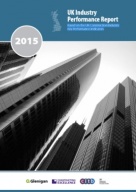2015 UK Industry Performance Report
On 17 September 2015, the annual UK Industry Performance Report based on the UK construction industry key performance indicators was published by Glenigan. The report was funded by the Construction Industry Training Board, supported by BRE SMARTWaste and endorsed by the Department of Business, Innovation and Skills and Constructing Excellence.
The report was based on construction projects completed during 2014. Some of its findings are summarised below:
- Project costs were on budget or better for 69% of projects, similar to 2013/14.
- Projects were on time or better 40% of the time, below the average of 45% in the years since 2003.
- Staff turnover increased to 5.3%, the highest since 2008.
- The proportion of women, people from black and minority ethnic backgrounds and those aged under 24, fell. The average proportion of women in the workforce fell from 19% to 13%, but this may be due to an increase in the number of site workers.
- Client satisfaction fell for the last three surveys.
- Ratings of service and value for money declined.
- Clients’ rating of consultancy teams was unchanged, remaining below previous peaks.
- Contractors’ satisfaction with clients and consults also fell.
- There were high levels of satisfaction with payment and information provision.
- Industry profitability rose to 2.8%, from 2.1% in the previous survey, but remained well below the 2009 peak of 9.9%.
- Projects became more environmentally efficient. Median energy use in construction was 199 kg CO2/ £100k project value, and the median project saw 21.6 m3 / £100k project value of waste removed from site.
- Building Information Modelling (BIM) was used on 13% of projects completed in 2014 compared to 9% in 2013 and 4% in 2012.
Stephen Radley, Director of Policy at CITB, said: “There are many positive results in this year’s report, but it shows there is no room for complacency. We welcome the return to growth, but project delays shows that the skills challenge is an issue for many across our industry.”
Allan Wilén, Economics Director at Glenigan, said: “The rapid upturn in activity during 2014 put pressure on capacity, manifesting itself in rising material and labour costs and extended delivery times. Evidence from this year’s KPIs suggests that construction firms have managed to keep control of costs, but delays to schedule have worsened… The construction industry is looking to a progressive growth in workload over the next few years. However the anticipated recovery presents fresh challenges: growing and up-skilling the workforce, delivering improved productivity and containing costs will be priorities.”
NB it is considered that the findings of the report may not be a full representation of the situation, as many of the projects competed during 2014 actually began during the depths of the recession.
Following publication of the report, CITB launched ‘Go Construct’, a new online service providing information about employment opportunities in the construction industry.
Featured articles and news
Government consultations for the summer of 2025
A year of Labour, past and present consultations on the environment, the built environment, training and tax.
CMA competitiveness probe of major housing developers
100 million affordable housing contributions committed with further consultation published.
Homes England supports Greencore Homes
42 new build affordable sustainable homes in Oxfordshire.
Zero carbon social housing: unlocking brownfield potential
Seven ZEDpod strategies for brownfield housing success.
CIOB report; a blueprint for SDGs and the built environment
Pairing the Sustainable Development Goals with projects.
Types, tests, standards and fires relating to external cladding
Brief descriptions with an extensive list of fires for review.
Latest Build UK Building Safety Regime explainer published
Key elements in one short, now updated document.
UKGBC launch the UK Climate Resilience Roadmap
First guidance of its kind on direct climate impacts for the built environment and how it can adapt.
CLC Health, Safety and Wellbeing Strategy 2025
Launched by the Minister for Industry to look at fatalities on site, improving mental health and other issues.
One of the most impressive Victorian architects. Book review.
Common Assessment Standard now with building safety
New CAS update now includes mandatory building safety questions.
RTPI leader to become new CIOB Chief Executive Officer
Dr Victoria Hills MRTPI, FICE to take over after Caroline Gumble’s departure.
Social and affordable housing, a long term plan for delivery
The “Delivering a Decade of Renewal for Social and Affordable Housing” strategy sets out future path.
A change to adoptive architecture
Effects of global weather warming on architectural detailing, material choice and human interaction.
The proposed publicly owned and backed subsidiary of Homes England, to facilitate new homes.
How big is the problem and what can we do to mitigate the effects?
Overheating guidance and tools for building designers
A number of cool guides to help with the heat.
The UK's Modern Industrial Strategy: A 10 year plan
Previous consultation criticism, current key elements and general support with some persisting reservations.
Building Safety Regulator reforms
New roles, new staff and a new fast track service pave the way for a single construction regulator.

























